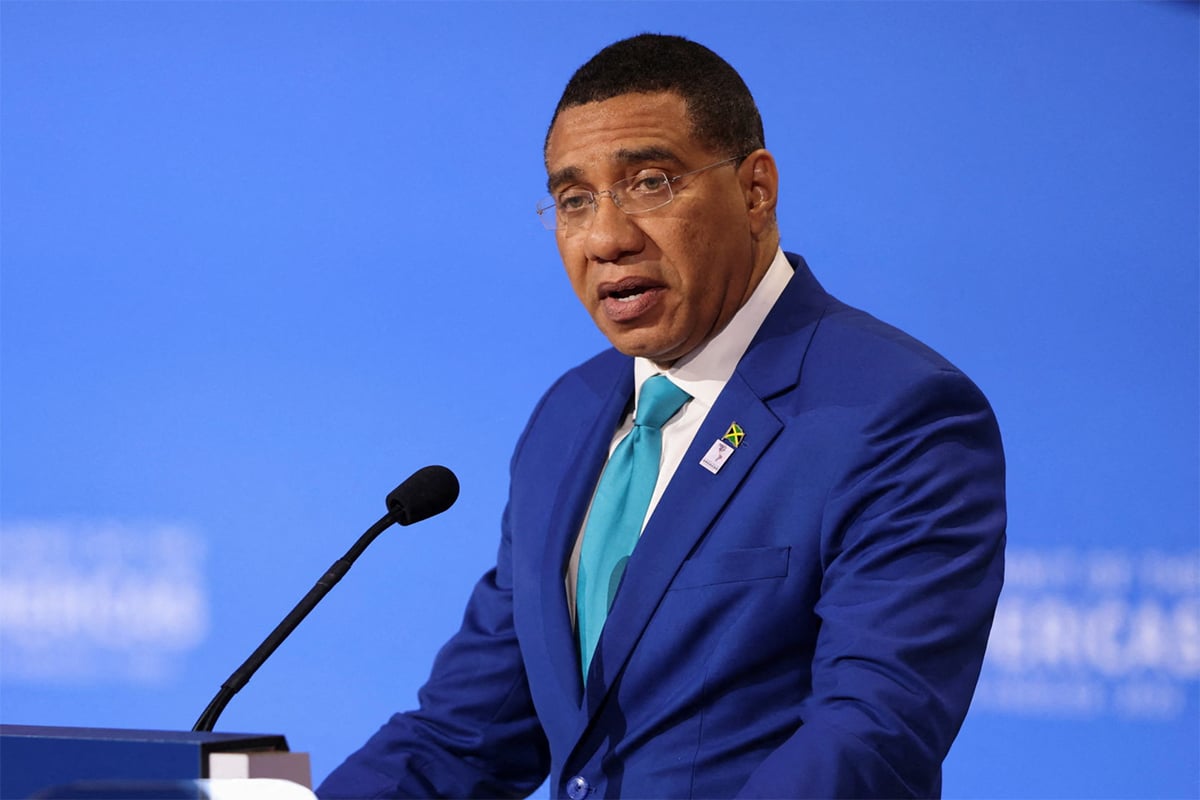PM Holness Says ‘Whap Whap And Ensure’ Shouldn’t Be Allowed To Define Jamaica

Prime Minister Andrew Holness has expressed unease about much of the content of the new music being recorded in Jamaica, chief among them Skillibeng’s Whap Whap and Brysco’s Code, which he says are sending the wrong message about the island, and which go against higher principles to which Jamaicans strive.
“We are being defined by some very limited things. Whap Whap and Chap Chap and Ensure… All of those things have their place, but it can’t define us. We should not allow that to define us,” Holness said during his address at a meeting of the Jamaica Labour Party in St. Catherine on Sunday.
Skillibeng’s popular gunplay song Whap Whap , featuring F.S., was released in March this year, while Brysco’s Code was released one month later and has captured attention for its suggestive use of the nutritional shake Ensure.
The Prime Minister’s statements come four months after he said that his administration will continue to maintain its hands-off approach, and would not censor Dancehall artists or their lyrical content, even if depraved or degenerate, but would instead, privately utilize the usual gentle persuasion. At the time he said he was aware that there were many concerns being raised n the general public about the distasteful content in much of the new music being released.
“There are many people who feel that the message has been diluted, diverted, and that though there is still talent, the talent may not be directed towards the social good,” Holness had said in an interview with The Entertainment Report.
In January 2021, whilst speaking at a Jamaica Stock Exchange event, Holness, even while giving pride of place to Jamaican music, had pointed out that while it is on par with science and technology as a tool for economic development, and was embraced by his Government and people globally, it has for decades, been inundated with songs of violence, which threaten its integrity.
Also, in April last year, in the aftermath of stinging criticisms of being duplicitous by several Dancehall artists, Holness had doubled down on his stance regarding the contribution of violent lyrics to the levels of crime on the island.
In an interview with Television Jamaica about the incessant violence on the island, the Prime Minister had steered the discourse to Dancehall and unwaveringly declared that as much as he loved the genre, and was an unapologetic fan, he had to be objective, as some of the lyrics were indeed glorifying violence and were, therefore, detrimental.
“There is a very sensitive topic which I will never resile from and which I have always raised, that whilst I am the biggest supporter of our music, our culture and I listen to Dancehall music – and I don’t apologise for it – I’ve always formed the view that the music could be so much more if it were less violent, less glorifying of violence,” the Prime Minister said.
“And my job is to reflect to the country the uncomfortable truths sometimes. I don’t believe in isolating culture. I don’t believe in leaving our deejays and our artistes on the periphery and not engage them,” he added then.
Holness had also said he has been the only Head of the Government to openly express his love for the art form and to fully engage Dancehall artists, in spite of whether or not they specialize in violent lyrics.
“More than any other Prime Minister, I have sought to lean forward and engage our Dancehall artists, even those who make songs that are violent. Because in a sense I understand the genre; I understand the culture,” Holness had said.
“But you would have to interpret my posture as saying: ‘listen guys; we have a responsibility and a duty, so even though it sounds good, and we are going to go to the party and dance to it and call forward for it again, at some point we have to realize that what we may be doing, is glorifying; that what we may be doing, is legitimizing violence,” he added.
Holness’ interview had come following a barrage of accusations from artists and ordinary Jamaicans who berated him for being hypocritical, after he told Parliament that violent music plays a role in influencing the behavior of some people who carry out vicious acts on their countrymen and women, and artistes, while entitled to their freedom of speech due to constitutional protection, also “have a duty to the children” who are listening to them.
Condemnation and accusations of hypocrisy had rained down on him for adopting the moniker ‘Brogad’, a term made popular by 6IX deejay Daddy1 in his song Brogad, while the other was his use of dubplates during the 2020 General Election, which were voiced personally for him by artists who are known for spitting violent lyrics with impunity.
